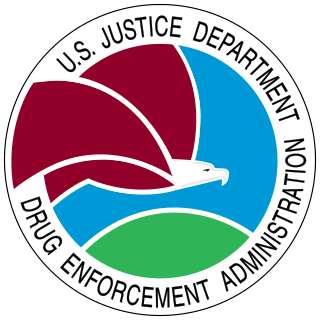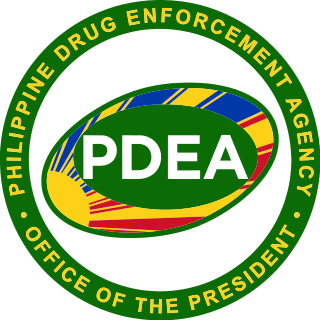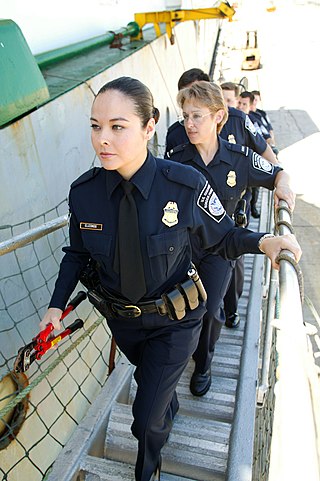Sources
- The Quest for Drug Control by David F. Musto, Pamela Korsmeyer
- PBS Frontline:Thirty Years of America's Drug War
The Office of Drug Abuse Law Enforcement (ODALE) was a Justice Department agency that Richard Nixon established in January 1972, headed by Myles Ambrose. The office was chiefly a tool for the federal government to assist local government in enforcing drug laws and oblige drug addicts to undergo rehabilitation. In July 1973, ODALE was consolidated, along with several other agencies, into the newly established Drug Enforcement Administration.

Law enforcement is the activity of some members of government who act in an organized manner to enforce the law by discovering, investigating, deterring, rehabilitating, or punishing people who violate the rules and norms governing that society. The term encompasses police, Courts and corrections. These three components of the criminal Justice system may operate independently of each other or collectively through the use of record sharing and cooperation. Throughout the world, law enforcement are also associated with protecting the public, life, property, and keeping the peace in society.

The United States Department of Justice (DOJ), also known as the Justice Department, is a federal executive department of the United States government tasked with the enforcement of federal law and administration of justice in the United States. It is equivalent to the justice or interior ministries of other countries. The department is headed by the U.S. attorney general, who reports directly to the president of the United States and is a member of the president's Cabinet. The current attorney general is Merrick Garland, who has served since March 2021.

The Drug Enforcement Administration (DEA) is a United States federal law enforcement agency under the U.S. Department of Justice tasked with combating illicit drug trafficking and distribution within the U.S. It is the lead agency for domestic enforcement of the Controlled Substances Act, sharing concurrent jurisdiction with the Federal Bureau of Investigation, the U.S. Immigration and Customs Enforcement, and U.S. Customs and Border Protection. However, the DEA has sole responsibility for coordinating and pursuing U.S. drug investigations both domestically and internationally.
Drug czar is an informal name for the person who directs drug-control policies in various areas. The term follows the informal use of the term czar in U.S. politics. The 'drug czar' title first appeared in a 1982 news story by United Press International that reported that, "[United States] Senators ... voted 62–34 to establish a 'drug czar' who would have overall responsibility for U.S. drug policy." Since then, several ad hoc executive positions established in both the United States and United Kingdom have subsequently been referred to in this manner.

The war on drugs is the policy of a global campaign, led by the United States federal government, of drug prohibition, military aid, and military intervention, with the aim of reducing the illegal drug trade in the United States. The initiative includes a set of drug policies that are intended to discourage the production, distribution, and consumption of psychoactive drugs that the participating governments, through United Nations treaties, have made illegal.

The United States National Drug Intelligence Center (NDIC), established in 1993, was a component of the U.S. Department of Justice and a member of the Intelligence Community. The General Counterdrug Intelligence Plan, implemented in February 2000, designated NDIC as the nation's principal center for strategic domestic counterdrug intelligence.
Law enforcement in Malaysia is performed by numerous law enforcement agencies and primarily the responsibility of the Royal Malaysia Police. Like many federal nations, the nature of the Constitution of Malaysia mandates law and order as a subject of a state, which means that local government bodies also have a role to play in law enforcement, therefore the bulk of the policing lies with the respective states and territories of Malaysia. Below are some of the law enforcement bodies and agencies of Malaysia.
Law enforcement in Indonesia is mainly performed by the Indonesian National Police (POLRI), together with other law enforcement agencies which are under the president, a certain ministry or State-owned company (BUMN) which perform policing duties for a certain public service, these law enforcement agencies are under supervision and are trained by the Indonesian National Police. The Indonesian National Police is basically the national civilian police force of the country responsible for enforcing law and order of the state.

The Organized Crime Drug Enforcement Task Force (OCDETF) is a federal drug enforcement program in the United States, overseen by the Attorney General and the Department of Justice. The principal mission of the OCDETF program is to identify, disrupt, and dismantle the major drug trafficking operations and tackle related crimes, such as money laundering, tax and weapon violations, and violent crime, and prosecute those primarily responsible for the nation's drug supply.

Transnational organized crime (TOC) is organized crime coordinated across national borders, involving groups or markets of individuals working in more than one country to plan and execute illegal business ventures. In order to achieve their goals, these criminal groups use systematic violence and corruption. Common transnational organized crimes include conveying drugs, conveying arms, trafficking for sex, toxic waste disposal, materials theft and poaching.

The Anti-Narcotics Force is a federal executive bureau and a paramilitary force of the Government of Pakistan, tasked with combating the narcotics smuggling and use within Pakistan. ANF works under the umbrella of Pakistan Army and Ministry of Narcotics Control (Pakistan) of which Mohsin Raza Naqvi is the minister since March 2024. Due to misconception on Section 4 of ANF ACT 1997, the force's head consisted of the active-duty general officer of Pakistan Army. Although the law prescribes that any competent person may be appointed as Director-General. Currently, a two-star Army Officer, Major general Muhammad Aniq Ur Rehman Malik is deputed as Director-General. The ANF also has sole responsibility for coordinating and pursuing Pakistan narcotics investigations abroad.

Food safety in China is a widespread concern for the country's agricultural industry and consumers. China's principal crops are rice, corn, wheat, soybeans, and cotton in addition to apples and other fruits and vegetables. China's principal livestock products include pork, beef, dairy, and eggs. The Chinese government oversees agricultural production as well as the manufacture of food packaging, containers, chemical additives, drug production, and business regulation. In recent years, the Chinese government attempted to consolidate food safety regulation with the creation of the State Food and Drug Administration of China in 2003; officials have also been under increasing public and international pressure to solve food safety problems. Chinese Vice Premier Li Keqiang said, "Food is essential, and safety should be a top priority. Food safety is closely related to people's lives and health and economic development and social harmony," at a State Council meeting in Beijing.

The Philippine Drug Enforcement Agency is the lead anti-drug law enforcement agency, responsible for preventing, investigating and combating any dangerous drugs, controlled precursors and essential chemicals within the Philippines. The agency is tasked with the enforcement of the penal and regulatory provisions of Republic Act No. 9165, otherwise known as the Comprehensive Dangerous Drugs Act of 2002.

The federal government of the United States empowers a wide range of federal law enforcement agencies to maintain law and public order related to matters affecting the country as a whole.

Myles Joseph Ambrose was an American lawyer and United States federal government official. He served as the Commissioner of Customs under President Richard M. Nixon and paved the way for the establishment of the Drug Enforcement Administration.

The Narcotics Control Bureau is an Indian central law enforcement and intelligence agency under the Ministry of Home Affairs, Government of India. The agency is tasked with combating drug trafficking and the use of illegal substances under the provisions of Narcotic Drugs and Psychotropic Substances Act.
A law enforcement agency (LEA) is any government agency responsible for law enforcement within a specific jurisdiction through the employment and deployment of law enforcement officers and their resources. The most common type of law enforcement agency is the police, but various other forms exist as well, including agencies that focus on specific legal violation, or are organized and overseen by certain authorities. They typically have various powers and legal rights to allow them to perform their duties, such as the power of arrest and the use of force.

Multijurisdictional Counterdrug Task Force Training (MCTFT) is a United States Department of Defense program managed by the National Guard that provides unique, tuition-free military and counterdrug training for local, state, federal, and military criminal justice professionals as well as awareness training for community leaders. The MCTFT program is funded by the Department of Defense and administered through the Florida National Guard, and exists to fulfill the counterdrug training needs of law enforcement personnel. Nationally responsive, the program meets the training needs of all 50 U.S. states and four U.S. territories.

The Dangerous Drugs Board is a government agency tasked in creating policies in dealing with illegal drugs in the Philippines.

John Ries Bartels Jr. is an American lawyer and was the first Administrator of the Drug Enforcement Administration. He was also the first Chief of the New Jersey Organized Crime Strike Force.